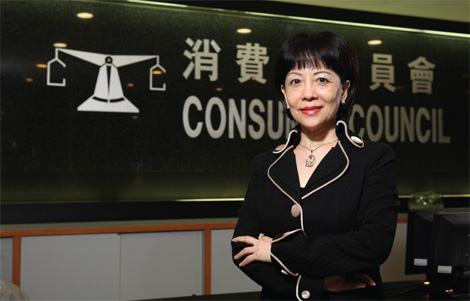Enhancing consumer protection
Updated: 2010-02-26 07:34
By Joseph Li(HK Edition)
|
|||||||

Connie Lau, chief executive of the Hong Kong Consumer Council, tells Joseph Li their ongoing work and the latest legislative proposals to enhance protection of consumer rights and the competitive environment.
On the recommendation of the Hong Kong Consumer Council, the Hong Kong SAR government has decided to amend the Trade Descriptions Ordinance by putting provision of services under statutory control in the same way as sales of goods.
The government also intends to enact a competition law in Hong Kong to target anti-competitive behaviors with a view to creating a fair, level playing field in Hong Kong.
Speaking in an exclusive interview with China Daily, Hong Kong Consumer Council chief executive Connie Lau said the council submitted a detailed report to the government in February 2008, calling for legislative control of unfair and unscrupulous trade practices.
The government responded positively by signaling its consent to revise the existing law and include services in the Trade Descriptions Ordinance. It is her understanding that the revised ordinance will target several types of longstanding unfair trade practices.
They include false or misleading descriptions of goods and services; insufficient information and misleading advertisements.
Aggressive and high pressure tactics and the 'bait and switch' trick will also be punished.
In addition, the new law will combat shops that accept payment without ability or intent to supply, and adopt unfair terms in standard contracts.
Regarding the potential competition law, Lau said it was the Consumer Council that first advocated this subject through a research report on competition among supermarkets in Hong Kong in 1992.
In 2006, the Competition Policy Review Committee proposed to enact a competition law in Hong Kong to regulate seven types of anti-competitive behaviors.
They are price-fixing, bid-rigging, unfair market allocation, sales and production quotas, joint boycotts, unfair or discriminatory standards, and the abuse of a dominant market position, such as predatory pricing.
The government will introduce a bill into the Legislative Council within the current legislative session after two rounds of public consultation to seek views of the business sector, she said.
Lau knows the government will publish a consultation paper around the first quarter to seek public views on outlawing dishonest and misleading trade practices in the provision of services prior to the enactment of the law amendment.
The competition law aims to provide a platform for fair competition in Hong Kong. It is her understanding that the law will define the anti-competitive behaviors and provide mechanisms to hear complaints and award damages, and will target both large corporations and small companies.
"The spirit of the competition law is to protect the small and medium enterprises so that they will not lose their competitive edge because they are not as powerful and influential as the large companies," she explained. "However," she added, "the law also targets small companies that may breach the law by way of price-fixing (by raising and cutting prices at the same time) and bid-rigging."
Though the competition law is not a statute that imposes criminal sanctions, she believes it will be a strong enough deterrent, since it imposes high enough fines upon the wrong-doers.
"In foreign countries, anti-competitive behaviors are criminal offences. But the Hong Kong government does not want to go there in the first step, because it has to pacify the dissenting voices of the commercial sector," she disclosed.
Referring to foreign examples, she said the fines are rather high, so that the involved parties cannot even offset the fines with the gains they pocket from the related anti-competitive commercial activities.
"The heavy fines, tarnished corporate image and weakened consumer confidence will be sufficient deterrents to even the large companies, because the names of the non-complying companies will be made published," she said.
(HK Edition 02/26/2010 page4)